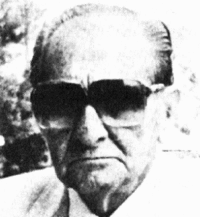Frank Tieri (mobster)

Alphonse Frank Tieri (February 22, 1904 - March 31, 1981), also known as "the Old Man" and "Funzi", was a New York mobster who eventually became boss of the Genovese crime family. Tieri was the first mobster to be convicted under the RICO Act.
Early life
Born in Naples, Italy, Tieri's family immigrated to New York in 1911. Tieri was denied US citizenship twice living as a resident alien in Brooklyn. Tieri lived in a modest home in the Bath Beach section of Brooklyn with his wife and two granddaughters. His mistress, a former opera singer from Italy, lived in a house a few blocks away. Tieri claimed to be an employee of a sportswear manufacturer.[1]
Boss
In 1972, after the murder of Genovese acting boss Thomas Eboli, Tieri became the boss of the Genovese family. At that time, it was speculated that Gambino crime family boss Carlo Gambino had ordered Eboli's murder because Eboli owed him $4 million. According to this theory, Gambino wanted Tieri to be boss of the Genovese family. However, most experts now believe that it was mobster Philip Lombardo who controlled Tieri, not Gambino.
Tieri was considered a low-profile and diplomatic mobster, a good earner for the family who believed in sharing the wealth with his capos and soldiers. He was convicted of armed robbery when he was aged twenty but avoided further indictments until the end of his life. Given that Tieri was a front boss, it is unknown how much power Lombardo allowed him. However, Tieri did have a reputation as orderly and smart manager who used violence only as a last resort.[1]
Bruno assassination
In 1980, Tieri played a key role in the assassination of Philadelphia crime family boss Angelo Bruno and the opening of Atlantic City, New Jersey to the New York crime families. The State of New Jersey had announced the introduction of legal casino gambling in Atlantic City and the New York families wanted to open operations there. However, Atlantic City belonged to the Philadelphia family and Bruno wasn't willing to share it. In March 1980, Tieri sent a message to Philadelphia capo Antonio Caponigro that the Mafia Commission would support him as boss if he assassinated Bruno. What Caponigro didn't know was that the Commission had no intention of sanctioning Bruno's murder. On March 21, 1980, Bruno was murdered in his car on a Philadelphia street. The Commission immediately summoned Caponigro to New York for a meeting; two weeks later, his body was discovered in New York with $20 bills stuffed in his orifices.[1] However, the New York families did achieve access to Atlantic City.
Conviction and death
Federal prosecutors eventually charged Tieri with being the head of a crime family that was involved in extortion, illegal gambling, and other criminal activities. In January 1981, the ailing Tieri, using a wheelchair and an oxygen tank, was convicted of violating the RICO act. At the sentencing, Tieri's lawyers argued for leniency, saying that he was dying. Prosecutors told the judge it was an act, and the judge sent Tieri to prison for ten years.[1]
On March 31, 1981, Tieri died of natural causes at Mount Sinai Hospital in New York. He is buried in Saint John's Cemetery, Queens, New York.[2]
References
- ↑ 1.0 1.1 1.2 1.3 "The Genovese Family: But Who's Really the Boss?" by Anthony Bruno TruTV Crime Library
- ↑ 'Funzi'%20Tieri Frank "Funzi" Tieri at Find-A-Grave
Further reading
- Capeci, Jerry. The Complete Idiot's Guide to the Mafia. Indianapolis: Alpha Books, 2002. ISBN 0-02-864225-2
- Jacobs, James B., Christopher Panarella and Jay Worthington. Busting the Mob: The United States Vs. Cosa Nostra. New York: NYU Press, 1994. ISBN 0-8147-4230-0
- Milhorn, H. Thomas. Crime: Computer Viruses to Twin Towers. Boca Raton, Florida: Universal Publishers, 2005. ISBN 1-58112-489-9
- Raab, Selwyn. Five Families: The Rise, Decline, and Resurgence of America's Most Powerful Mafia Empires. New York: St. Martin Press, 2005. ISBN 0-312-30094-8
| Business positions | ||
|---|---|---|
| Preceded by Jerry Catena |
Genovese crime family Underboss 1972-1981 |
Succeeded by Carmine "Little Eli" Zeccardi |
| Preceded by Carmine "Little Eli" Zeccardi |
Genovese crime family Front boss 1972-1981 |
Succeeded by Anthony Salerno |
| |||||||||||||||||||||||||||||||||||||||||